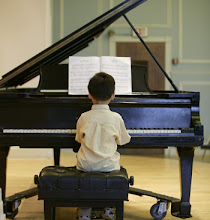Every Wednesday, I pick up my
daughter from school at Germantown Friends School
and drive the short trip to Settlement’s Germantown
branch. We make our way up the second floor to the music studio. We’ve been
doing this for about 6 years now. This is her first year at GFS; the past 5
years of lessons, we have come from Greene Street Friends, only a block
shorter.
Between lessons here is a lot like
between classes at a school, in terms of activity. You see a mix of
students and parents coming in: reluctant toddlers being pushed along by their
parents, teenagers arriving on their own with their instruments, excited
youngsters hurrying, their parents close behind. Many
join me in the hallway, with book or smartphone in hand, waiting for the lesson
to finish, while others go into the lesson with their kids. What I like
is seeing all these different people coming in and out, it’s more of a
community than an individual lesson in your house. You feel like you’re part of
something bigger and more interesting.
 |
| The view from the hall at the Germantown branch |
Many weeks, it’s just me and all the lessons going on – piano in one
room, strings in another, drums down the hall. Just
as I can hear lessons through the doors of the practice rooms, I can listen to
the teachers play their own music in the gaps between their lessons or if their
next student is running late. Just from these short practice sessions, I
realize how accomplished they are, and how fortunate I am to have my daughter
being taught by one of them.
Now that she’s 15, my daughter more actively appreciates the accomplishments of her teacher. This past summer, we attended a concert by in which her teacher performed. It featured Baroque music on period-accurate instruments. Her performance was wonderful, and afterwards my daughter and I talked about how good she was. Now, did this inspire her to practice more? Did she suddenly feel the need to learn harder pieces, become more focused?
Now that she’s 15, my daughter more actively appreciates the accomplishments of her teacher. This past summer, we attended a concert by in which her teacher performed. It featured Baroque music on period-accurate instruments. Her performance was wonderful, and afterwards my daughter and I talked about how good she was. Now, did this inspire her to practice more? Did she suddenly feel the need to learn harder pieces, become more focused?
Not exactly. But I do think she is more respectful of her lesson time, now
that she knows the relationship with her teacher is more than just the thirty
minutes she spends with her each week. She’s also starting to write her own
songs and lyrics. She takes what she’s learning in her lessons and
applies it to the music she likes to create. She wouldn’t have the vocabulary
or the knowledge to do this otherwise. Her mother and I felt she needed music
education in her life, not so she would become a concert pianist, but so she
could get to know an instrument she could use and enjoy and benefit from for life.












.gif)































